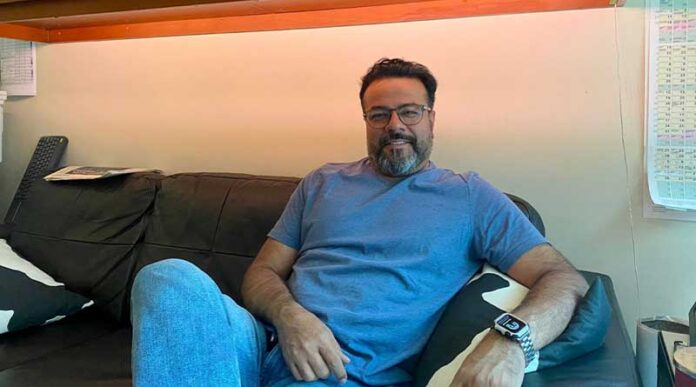By Hala Nasar
Ali Khawaja is a Business Professor at the American University of Sharjah since 2002 and an entrepreneur. He is involved in several startups, including one focused on raising awareness on mental health issues. He is also the host of a podcast that covers an array of topics pertaining to mental health with industry professionals. His podcast can be found on www.mentalhealth.ae
How did you get involved in the mental health sector?
A little over three and a half years ago, myself and my student at the time, who is graduated now, we were working on a totally different project and she came to me that one of her friends was having some struggles and issues with mental health stuff. And me being me, said “search Google till you find a solution,” easy, no need to think about it.
And then she’s like, I can’t find anything except just ads for different things. I said “it’s not possible.” So, I started Googling with her and I’m like, “why can’t I find anything? This is so weird.” And then something just kind of clicked in my head, like why, why are there not people addressing these issues? Maybe the issue is not that big. I’m in business, right? So, I’m thinking supply demand. If there’s no demand, why would somebody create businesses for it? And then I spent about two weeks deep diving trying to find data for the UAE Middle East, didn’t really find anything of substance. Then expanded my search, started looking globally at data, and then I found that 20-25 percent of people on average globally are suffering with something. And that’s a ridiculously significant number. This is not two percent or five percent. This is huge. You know, if I teach four sections in a semester, one out of those four sections are having some sort of struggles.
Then the question became, well, why aren’t we identifying the problem? Obviously, the solution exists. So, why aren’t we addressing how big the problem is? Starting having talks with people and then realize that the issue is stigma. People are just not ready to talk about it. Just societal stigma. Family stigma. There’s personal stigma; there’s embarrassment. I don’t want to say I’m having anxiety attacks. I don’t want to say I’m feeling depressed. You know, the default thing that everyone says, you amongst all your friends, forget people you don’t know. How are you doing? Good. It’s automatic. It’s the default answer.
I just kind of sat there thinking something needs to be done. So, I thought maybe put together a website. I searched for “mental health” and mentalhealth.ae was available. I booked it. I sent the link to Latifa. I’m like, “check this website out.” She goes, “oh, there’s a website! it’s blank.” I said, “yes, I just got it. This is our new project.” And that’s literally how everything started.
What is something personal that helped you find the answers to the questions you had?
I remembered my mom’s words; I’ve always gotten great advice from her my entire life. As a kid, she used to tell me that if something needs to be done and somebody’s not doing it, don’t point fingers, don’t blame, don’t complain. Just do it yourself.
Is that what made you want to take a chance on it and take initiative to do it?
Well, one of the buzzwords that you hear about these days is “Social Entrepreneur.” So, we’re an entrepreneur, but we also kind of think about social causes. And it’s a balance between what the world needs and me making money, versus I just want to make money. So that’s something new. But I was always raised with understanding the impact that you can create in somebody’s life is more valuable than whatever money you’re going to make.
So, the idea was: let’s put this website together, we need to have an Instagram; otherwise, how are we going to reach? And then let’s see. And then that later expanded into a meet up group, then later when COVID hit, that expanded it into zoom sessions. Then the zoom sessions got recorded, became YouTube videos. Now we have an entire line of podcast series that are coming out. So, it just kind of organically exploded, but the idea was just impact.
That’s it, if we can help one person. Live a little easier. Why not?
What’s the sort of reaction and feedback did you receive from people?
It’s been great. Our very first meet up that we held just for information gathering, we had ten-ish people sign up, and usually for these online free meetups only half show up. We had 20-something show up. The meeting was supposed to be an hour. It went for two and a half hours. Between me and Latifa, we walked away with more than 15 pages of notes of things that they would like to have.
I remember sitting with her the next day, going over our notes, and she goes, “we can’t do these things.” I’m like, “yes, we can’t do all of them, but we can do some of them. Whatever is within our reach, let’s start there.”
What were some of the requests from people?
The most common feedback we got was a support group.
There were support groups few and far between pre-COVID and since COVID there’s been a couple that are reasonably active. So, we started a peer-to-peer support group. Just come, just talk, and we called it “Wellness Wednesday,” and we just started rolling it out. We did it every other week and then we did it once a month and we did it once a week. We tried all combinations to see where it would be that sweet spot. It’s been great. We’ve got phenomenal response. I get tons of feedback. Our DM for the Instagram account for mental health constantly has people messaging asking hey can you help with this? Can you recommend something this? Can you do this? Emails are coming in.
But on the website, we have for example, the continuum is there, the “feelings wheel” is there in Arabic and we constantly get requests of “hey, can we use this?” from clinics in Saudi Arabia, and I’m like “guys, it literally says free to use, free to print. If you want me to print and send you a copy, we’re happy to do that, also.” So, we’ve got a phenomenal response.
How did you manage to set up everything so quickly?
All of this is volunteer built! One of Latifa’s cousins volunteered, and then another one of our close friends volunteered to help with the Arabic translation. I think 80-90 percent of the website is available in Arabic. It’s just the newer stuff that hasn’t been translated, so we’re playing a little bit of catch up.
How does it feel to be part of this initiative and a community such as this?
It’s very humbling, to be honest.
You get so busy with life. Whatever is going on, whether it’s for you guys who are in college or studies or, if people are working in corporate or they’ve got families, you just get so caught up. You get so busy; you really don’t take a moment to pause and appreciate what you have.
When I started this initiative three and a half years ago, I think since then I’ve literally spoken to thousands of people at this point in this context. And the stories that they share, some of them are so heartbreaking; you find it hard to breathe just listening to it.
Then then you realize, you know what? I’ve just been running in this rat race, trying to succeed, and I don’t understand what. Maybe I need to take a moment to humble myself and have times of self-reflection and gratitude and appreciation.
Not only do we live in a tough world, but the world is a lot tougher for some people.
Did being involved in all of this make you more in tune with your own emotions and your own mental health?
Oh yes. The first thing in any scenario is education and awareness. I have a business background. I don’t have a background in psychology or mental health or any of these things. So, I spent a lot of time reading, a lot of time learning everything from YouTube videos, to Udemy courses, to books, to articles. Whatever I could get my hands on just to feed that curiosity. And it was massively eye opening to understand -to my mind- an entire parallel universe.
I teach on average, let’s say 100 to 120 students a semester. So, for me to fathom that you know a quarter of them, 20 to 30 of them, every semester, have been struggling and dealing with issues and me standing in front of a classroom since I started teaching in 2002, not realizing that people have been struggling. That was just mind boggling to me. I’m like, how could I not see this? And then the realization, as well, that you can’t see it if everybody’s hiding it.
How has your progress been since you learnt this information?
It’s been very slow. Very arduous. But, building that kind of safe space for people to come and say to them, “look, it’s OK to share whatever you want to share.”
For example, our Wellness circle; the rules are there are no rules. Share if you want, don’t share if you don’t want. Just sit and listen. But the important thing for you to understand is you’re not alone and this is a safe space. And what’s unfortunate, is people don’t find this safe space in their families, at their dinner tables. And that’s really hard.
What’s an important lesson you learned along the way?
Listening!
So, what was interesting was just prior to all of this starting, I had started training to be a coach with ICF. They’re one of the largest accrediting bodies. Their process of becoming a coach is very arduous; it takes a lot of stuff. It’s not like one of those weekend courses and poof! I’m a coach.
So, one of the things that I learned in coaching was listening. I always thought I was a great listener, and I’ve been told I’m a good listener my entire life. But then, when I was doing my coach training, I was like, “wait, wait, they’re talking about listening at a whole different level.” And that was massive eye opener.
And shortly after I finished all my training and did my credentials and clocked in my hours, the mental health thing kind of fell in my lap. And what I realized was that, you know what? Listening when people are talking is one thing, but listening when they’re not talking is a whole different thing.
As a professor, how has being part of the mental health sector help you connect more with your students?
So, I’ve been able to bring all my experiences back into me as an educator. So, you know, listening to students better, understanding where they’re really having struggles with creating pockets of time even within my course and my curriculum because maybe something’s going on or something happened, maybe there’s combination of midterm and events and now we have a perfect storm. I ask myself; can I be flexible by one class and push the content? I’ve started creating these types of pockets.
So, it has enabled me in practicality in the classroom to be a little bit more flexible. And that really allows for a lot of students that breathing space that they needed.
You mentioned listening when somebody’s not talking. Can you tell me about an instance when something like that happened?
Once you start doing this, you start seeing it in a lot of places. Especially with your friends.
For most people, you think you know your friends. In reality, you only know what they want you to know. You only know what they project as a friend.
What’s interesting is, when I’m sitting with my friends and we’re talking about whatever, when they’re not talking, their body language speaks volumes.
“Hey man, what’s going on?”
“Oh, nothing it’s all good.”
I’m like, “something’s up. Something’s up. Talk to me.”
Then, they’ll be quiet for a while and then, you have to allow for that silence. We have a bad habit of rushing to fill silence. You allow for the silence. You let the silence sit. This is the time that the other person is taking to gather their thoughts. You know, building that courage to share that little bit. But because you were listening to what was not being said and because you created that silence and then you held it, the person had enough time to build the courage.
You have to really be brave to share, right? To build the courage and to be able to share what they really needed to share.
How has your childhood and own family life shaped how you view mental health?
I think one of the things that I realized early on, probably in high school and college was that I was raised very differently. And I talk about this a lot, even in my podcast. So, with my mom, she’s been pivotal, the most pivotal person in my life. She always had an open-door policy. Talk about whatever you want to talk about. You know, coming from a conservative Pakistani Muslim household, you would never expect your mother to be the one to tell you, as a guy, “hey, I know you’re going to have sex-Ed classes this week in school. If you have questions afterwards, come and ask me.”
What? My friends weren’t even given permission to do the sex-Ed classes. My mom not only gave permission, she said come back and ask me if you have questions. So, I was raised in a household where it was always OK to ask questions. It was always OK to have discussions.
The only thing we didn’t have is the contextual knowledge. We didn’t know. Yes, we knew what sadness is; we kind of knew what depression is. But beyond the very basic few keywords that are thrown here and there, nobody really knew what are different levels of mental health or what are mental health illnesses. Because this was never taught at any point to anybody. Just like personal finance is not taught, how to manage yourself and your feelings and emotions are also not taught, neither at school or in the household.
And then, I realized around high school and college that when I would talk to my friends, they were not able to have these conversations because they were very taboo. And I’m like, why is something like sex-Ed or mental health a taboo subject? That’s weird to me. Why is that weird? But then I realized, wait a second, I’m the only one who’s thinking this. So, my experience is the unique experience. Whoops.
I want to jump back to something that you said previously about people not finding that comfort at their dinner tables with their families. How has being involved in this helped you with your own family?
In my household, now with my kids, no topic is off discussion on the table. Whatever you want to talk about at the dinner table or in private or however it is, you’re welcome to it. But there’s a huge difference between, let’s say, when my parents grew up, when I grew up, and when my kids grew up. My parents grew up without Internet. The only source of knowledge or news was the classroom, parents and the newspaper. I grew up when the Internet started. So, I’ve seen that shift in access to knowledge happen. My kids have grown up with the Internet from day zero. So, these three generational examples of how they had access to information and the knowledge they have is vastly different.
My kids at any given age that they were, compared to me and compared to my parents, the amount of information that they already knew and understood is ridiculous. So, they know these terms. They know what safe space means. They know what bipolar means. They know what schizophrenia means. They know anxiety. They know what panic attack is. They know these terms. I didn’t know these terms. I just never had access to them, but they do.
And the other thing is that we’re seeing a shift in reducing the stigma because the societies have become globalized, right? So, because the planet got really small really quick, a lot of the discussions with this generation, my kids’ generation, they are in high school at this point, and that discussion is normalized to a significantly reasonable extent.
What is a piece of advice that you’d like to share with the readers?
When you ask your friends how they’re doing, ask them that question twice.
And the second time you ask it, drop the word “really” in there. “How are you doing?” And then ask, “how are you really doing?”
And then hold the silence, hold the space.
You will see their body language change, the expression in their face change. You will see their eyes change. Because they’ve been holding something for, I don’t know how long, and they’ve never had anyone to listen. You might literally be the first one they’ve ever been able to talk to and unburden themselves of this. This thing that they’ve been carrying around.
So, ask them twice how they’re doing.


















